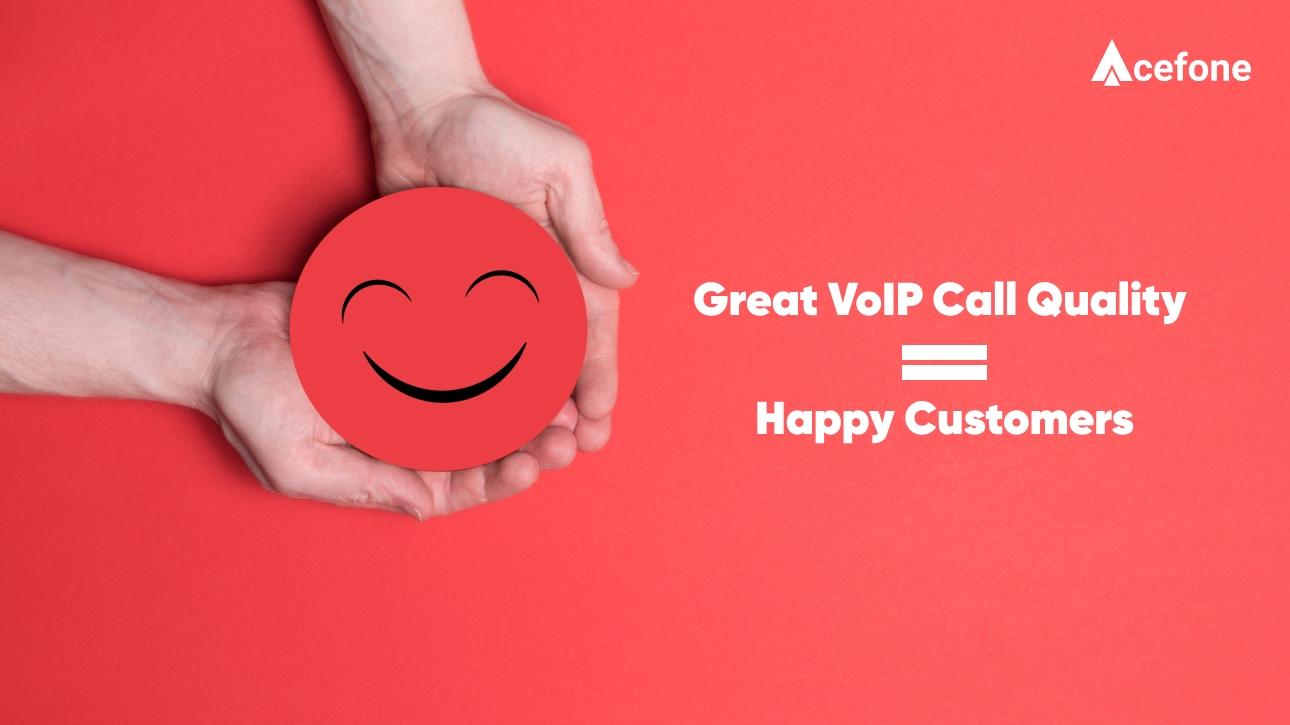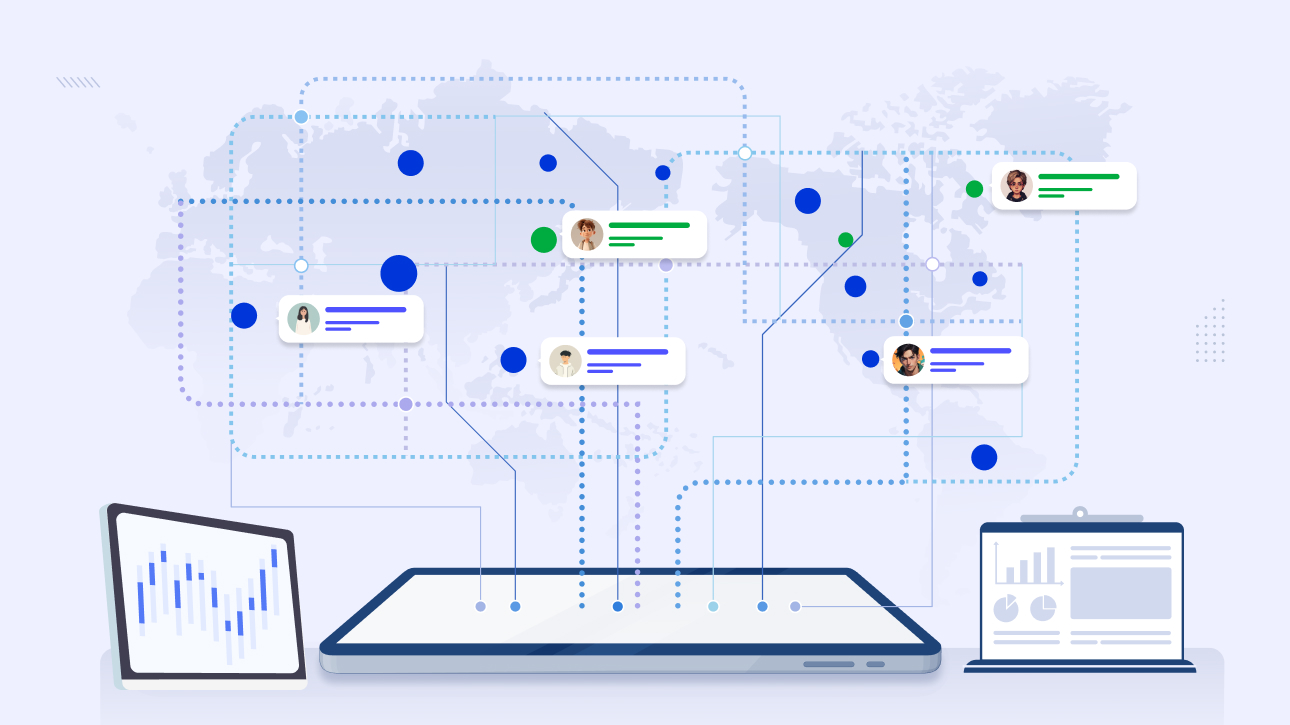A solution that helps you communicate remotely, scales up or down whenever required, and saves 50-70% of communication costs sounds like the gold standard for your business. This might also be the reason why business VoIP systems are widely adopted by companies worldwide.
Despite its advantages, how can you be sure that you can rely on VoIP for your day-to-day operations?
Will it ensure each interaction with your customer doesn’t turn into an “am I audible?” echo chamber?
And how will it keep your customer’s sensitive data safe?
Let’s find out.
How Does VoIP Work for Business Calling?
VoIP-based business call management systems enable faster calls over the Internet rather than using traditional phone lines. By converting voice signals into data packets for transmission, VoIP reduces costs and increases flexibility. Here is how it works:
- You call with a business VoIP systems
- Codecs convert the audio into digital signals
- Signals are transmitted as data packets
- Packets are routed to the recipient phone
- Receiver’s device decodes the digital signals
Now that you know how business VoIP systems work, let’s understand whether they are reliable or not; along with factors that make it so.
Read more here about: VoIP vs wifi calling
Is VoIP Most Reliable for Business Communication?
Yes, most of modern business VoIP systems are equipped with features that make them reliable to handle different kinds of interactions. For instance, you will find a combination of popular codecs like G.711 for seamless interaction with a PSTN system, G.722 to support HD voice, and Opus for adaptation to network availability.
*Reference link: What Are VoIP Codecs? How They Work & Affect Call Quality*
Aside from ensuring quality, VoIP providers also offer N+1 infrastructure for a failure-proof business call management system.
Here are a few vital factors that contribute to the reliability of VoIP phones:
Top 7 Factors That Ensure the Most Reliable VoIP System

Internet Advancement
The reliability of business VoIP systems has increased dramatically in recent years due to high-speed broadband Internet. Cable, fiber, and even 5G Wi-fi connections use far more consistent bandwidth with much less latency. As a result, VoIP calls are crystal clear with no drops or network jitter.
Cloud-based Infrastructure
Instead of connecting from an on-premises system that might go dark in an emergency, most reliable VoIP systems have redundant, geographically distinct data centers. They are continually linked via tier-one fiber networks. So, if one of the data centers faces an outage, your calls are transferred between locations automatically to maintain maximum uptime.
Advanced Quality of Service (QoS) Mechanisms
Most reliable VoIP systems use advanced QoS technology to give voice traffic priority over other data on a network. These mechanisms ensure that even during periods of high bandwidth usage, calls get priority, reducing delays, packet loss, and jitter. As a result, your team and customers experience consistent call quality, regardless of network conditions.
Communication Devices
The quality of your VoIP calls also depends on the devices you use for communication and how regularly you maintain them. Whether you are using IP phones, softphones, or mobile devices, each device’s compatibility with the VoIP system can impact call quality. Devices with high-quality microphones and speakers can help you ensure clear communication.
Regular device maintenance is also essential to prevent disruptions caused by outdated or faulty hardware.
Choice of Service Provider
Your VoIP service providers plays a pivotal role in the overall reliability of your business VoIP system. Opting for a reputable provider with a proven track record in uptime guarantees, prompt customer support, and scalability ensures that your VoIP system remains stable. Look for providers that offer quality service, robust features, and Service Level Agreements that ensure reliability.
Is VoIP Reliable? Top 7 Factors to Consider for Business Calling
Data Backup & Outage Prevention
Continuity is key for any business call management system. In case of power outages or system failures, having data backup systems and a reliable disaster recovery plan is crucial. Many VoIP providers offer cloud-based services with built-in redundancy, ensuring that your phone system remains operational even during outages. Regular system backups can also protect your call data, ensuring that no valuable information is lost during an interruption.
Phone System Simplicity
A business VoIP system that is easy to manage and configure can reduce the risk of reliability issues. Complex systems with too many moving parts may introduce points of failure. A simplified VoIP setup with a user-friendly interface can make troubleshooting and maintenance easier, allowing your team to resolve potential issues quickly and minimize downtime.
Read our blog here: VoIP Vs Landlines
Security Protocols
VoIP systems can be vulnerable to cyberattacks such as DDoS (Distributed Denial of Service) or VoIP fraud if not properly secured. Ensuring that your system has strong security protocols in place, such as encryption, VoIP firewalls, and secure SIP (Session Initiation Protocol), helps prevent these vulnerabilities. Regular security updates and monitoring also ensure that your business VoIP system remains safe and reliable.
Bottom Line – How Reliable is VoIP for Business Phone Systems?
VoIP has proven to be a reliable communication tool for businesses with the right factors in place. Internet connection stability, device quality, the right service provider, and secure configurations are all essential in ensuring consistent performance. By considering these factors and taking steps to optimize your system, you can enjoy the benefits of VoIP communication without compromising on reliability.
However, not all solutions are created equal. Investing in one of the tech-forward, and most reliable VoIP systems like Acefone can take you a step further. With its robust omnichannel functionality, Acefone helps you manage voice and video calling, messaging, and emails seamlessly from one platform. This way, you can create a fail-proof interaction ecosystem for your customers on whichever channel they prefer.














